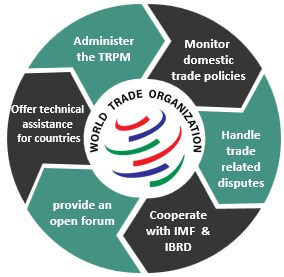Economy
WTO Panel Rules Against India
- 19 Apr 2023
- 7 min read
For Prelims: WTO, European Union, Protectionism, ITA.
For Mains: WTO Panel Rules Against India.
Why in News?
Recently, a World Trade Organization (WTO) Panel has ruled against India in a dispute over information technology (IT) tariffs with the European Union (EU) and other countries.
What are the Key Highlights?
- Background:
- India has been looking to promote domestic IT manufacturing and reduce its dependence on imports, but this approach has been challenged by the EU and other countries, who argue that such measures are Protectionist and violate Global Trade Rules.
- In 2019, the EU challenged India's introduction of import duties of between 7.5% and 20% for a wide range of IT products, such as mobile phones and components, as well as integrated circuits, saying they exceeded the maximum rate.
- Japan and Taiwan also complained the same.
- Ruling:
- The panel found that India's tariffs on certain IT products violated global trading rules, as they were inconsistent with the terms of the Information Technology Agreement (ITA).
- The ITA is a global trade agreement that aims to eliminate tariffs on a wide range of IT products. India is signatory to the 1996 ITA.
- The ruling has highlighted the need for India to align its trade policies with global norms and obligations.
- It also underscores the challenges that developing countries like India face in balancing their domestic policy objectives with their international trade commitments.
- The panel found that India's tariffs on certain IT products violated global trading rules, as they were inconsistent with the terms of the Information Technology Agreement (ITA).
- India’s Argument:
- India argued that at the time of signing the ITA, products such as smartphones did not exist and hence, it was not bound to eliminate tariffs on such items.
- Implications:
- According to the European Commission, the EU is India's third-largest trading partner, accounting for 10.8% of total Indian trade in 2021.
- The WTO ruling against India may have significant implications for trade relations between India and the EU, as well as Japan and Taiwan.
- India may be required to lower or eliminate the import duties that were challenged by the EU and other countries. This could have an impact on India's domestic manufacturing sector, which has been protected by such tariffs.
What Options does India have after the WTO ruling?
- India has a choice to appeal against the WTO ruling over IT tariffs, but if India Appeals the case will be held in Legal Purgatory.
- This is because the WTO's top appeals bench is no longer functioning due to the US opposition to judge appointments.
- Legal purgatory is used to describe a situation where a legal case or dispute is in a state of limbo, without resolution or a clear path forward.
- This situation can be particularly challenging for countries that are seeking to resolve trade disputes in a transparent and rules-based manner, as it undermines the effectiveness of the WTO's dispute settlement mechanism.
What is the World Trade Organization (WTO)?
- About:
- It came into being in 1995. The WTO is the successor to the General Agreement on Tariffs and Trade (GATT) established in the wake of the Second World War.
- Its objective is to help trade flow smoothly, freely and predictably.
- It has 164 members, accounting for 98% of world trade.
- It was developed through a series of trade negotiations, or rounds, held under the GATT.
- GATT is a set of multilateral trade agreements aimed at the abolition of quotas and the reduction of tariff duties among the contracting nations.
- The WTO’s rules – the agreements – are the result of negotiations between the members.
- The current set is largely the outcome of the 1986- 94 Uruguay Round negotiations, which included a major revision of the original GATT.
- The WTO Secretariat is based in Geneva (Switzerland).
- It came into being in 1995. The WTO is the successor to the General Agreement on Tariffs and Trade (GATT) established in the wake of the Second World War.
- WTO Ministerial Conference:
- It is the WTO’s top decision-making body and usually meets every two years.
- All members of the WTO are involved in the MC, and they can take decisions on all matters covered under any multilateral trade agreements.
- Concerns:
- WTO’s top Appeals Officials are no longer functioning because of the US opposition to judge appointments.
- The current situation highlights the challenges that the WTO faces in resolving trade disputes in the current global context, where countries are increasingly adopting protectionist measures and challenging the rules-based international trading system.
UPSC Civil Services, Previous Years Questions (PYQ)
Q. Consider the following statements: (2017)
- India has ratified the Trade Facilitation Agreement (TFA) of WTO.
- TFA is a part of WTO’s Bali Ministerial Package of 2013.
- TFA came into force in January 2016.
Which of the statements given above is/are correct?
(a) 1 and 2 only
(b) 1 and 3 only
(c) 2 and 3 only
(d) 1, 2 and 3
Ans:(a)
Exp:
- Trade Facilitation Agreement (TFA) was negotiated at the 2013 Bali Ministerial Conference. Hence,statement 2 is correct.
- It entered into force on 22 February 2017 following its ratification by two-thirds of the WTO members. Hence, statement 3 is not correct.
- India had ratified TFA in 2016. Hence, statement 1 is correct.
- The TFA contains provisions for expediting the movement, release and clearance of goods, including goods in transit. It also sets out measures for effective cooperation between customs and other appropriate authorities on trade facilitation and customs compliance issues. It further contains provisions for technical assistance and capacity building in this area.
- Therefore, option (a) is the correct answer.





